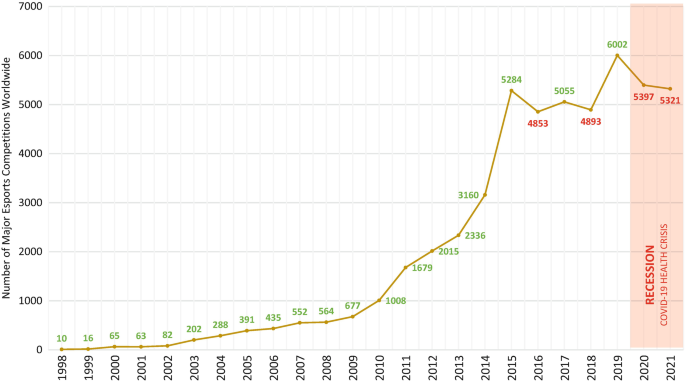The COVID-19 pandemic has swept throughout the globe, leaving no business untouched. One space that has skilled each challenges and alternatives amidst this upheaval is esports. As conventional sports activities leagues halted operations and stay occasions had been canceled, esports emerged as a resilient different, providing leisure to thousands and thousands of followers worldwide. Nevertheless, the pandemic additionally prompted important adjustments in event codecs, group, and the general panorama of aggressive gaming. On this article, we delve into the multifaceted influence of the pandemic on esports, exploring its rising recognition and the transformative shifts it catalyzed within the business.
Rise in Reputation
With folks worldwide confined to their houses because of lockdown measures and social distancing protocols, the demand for on-line leisure surged. Esports with its accessibility and digital nature, emerged as a pure different to conventional sports activities. In contrast to bodily sports activities, which depend on giant gatherings and bodily proximity, esports tournaments might proceed just about, unaffected by the restrictions imposed by the pandemic.
The surge in recognition of esports in the course of the pandemic was evidenced by the exponential development in viewership numbers throughout streaming platforms comparable to Twitch, YouTube Gaming, and Fb Gaming. As folks sought avenues for social connection and engagement, they turned to those platforms to look at stay esports tournaments, which boosted the recognition of cs2 buying and selling websites, cheer for his or her favourite groups, and work together with fellow followers in real-time.
Esports
Furthermore, the absence of conventional sports activities occasions created an unprecedented alternative for esports to seize the eye of a broader viewers. Main broadcasters, together with ESPN, BBC, and Sky Sports activities, acknowledged the attraction of esports and integrated gaming content material into their programming schedules. This mainstream publicity helped legitimize esports as a respectable type of leisure and competitors, breaking down limitations and attracting new fanatics to the scene.
The rise in recognition of esports in the course of the pandemic was not restricted to spectators alone. Many people, confined to their houses with additional time on their fingers, additionally turned to gaming as a way of leisure and socialization. Esports supplied an outlet for people to attach with associates and friends just about, fostering a way of neighborhood in a time of isolation.
Moreover, the pandemic accelerated the convergence between esports and different industries, comparable to leisure, know-how, and trend. Celebrities, musicians, and influencers more and more grew to become concerned in esports, taking part in tournaments, sponsoring groups, and fascinating with followers on social media platforms. This cross-pollination of industries introduced new audiences to esports and contributed to its rising recognition on a worldwide scale.
Variations in Event Codecs and Group
Esports organizers swiftly pivoted to on-line tournaments as a way of sustaining aggressive integrity and fascinating with followers. By leveraging digital platforms and know-how, tournaments had been performed solely on-line, permitting gamers to compete remotely from the security of their houses. This transition enabled the continuation of esports occasions whereas adhering to social distancing protocols and well being tips.
Regardless of the advantages of on-line tournaments, they offered a number of challenges distinctive to the digital realm. One important problem was making certain honest play and stopping dishonest in a web-based setting. Esports organizers applied sturdy anti-cheat measures and monitoring programs to keep up the integrity of competitions and safeguard towards dishonest incidents.
One other problem was addressing considerations associated to community stability and latency points, which might doubtlessly influence gameplay and the general viewing expertise. Esports organizations labored carefully with know-how companions and web service suppliers to optimize community infrastructure and decrease disruptions throughout on-line tournaments.
Furthermore, the absence of stay audiences and the electrical ambiance attribute of in-person occasions posed a problem when it comes to sustaining viewer engagement and pleasure. Esports organizers experimented with varied methods, comparable to digital fan experiences, interactive options, and enhanced manufacturing worth, to copy the fun of stay occasions in a web-based setting.
Esports Business
The transition to on-line tournaments additionally catalyzed the evolution of event codecs throughout the esports business. Organizers explored new codecs and buildings that maximized engagement and accommodated the distant nature of competitors. This included the adoption of on-line qualifiers, regional tournaments, and modern bracket programs tailor-made to the digital setting.
Moreover, esports organizations launched measures to reinforce participant security and well-being throughout on-line competitions. This included implementing protocols for safe communication, making certain information privateness, and offering assist providers for gamers coping with the psychological impacts of extended on-line gaming.
Whereas the shift to on-line tournaments was necessitated by the pandemic, it has additionally opened up new alternatives and prospects for the esports business. On-line competitions have demonstrated the resilience and flexibility of esports, showcasing its skill to thrive in difficult circumstances.
Transformation of the Esports Ecosystem
Probably the most notable transformations witnessed in the course of the pandemic is the convergence between conventional sports activities and esports. With stay sports activities occasions on hiatus, sports activities organizations and athletes more and more turned to esports as a way of staying related with followers and sustaining engagement. {Many professional} sports activities leagues, together with the NBA, NFL, and Method 1, organized digital tournaments that includes gamers and groups competing in common esports titles.
Equally, conventional sports activities golf equipment and organizations expanded their involvement in esports by investing in gaming franchises and establishing esports groups. This convergence has blurred the traces between the 2 industries, creating synergies and alternatives for collaboration. Because of this, esports has gained larger mainstream acceptance and legitimacy, with conventional sports activities followers embracing aggressive gaming as a complementary type of leisure.
The pandemic-induced disruptions to stay occasions and sponsorship offers prompted esports organizations to diversify their income streams and discover new sources of earnings. With conventional income sources unsure, many organizations targeted on content material creation, merchandise gross sales, and digital partnerships to maintain their operations.
Content material creation emerged as a very profitable avenue for esports organizations, as they leveraged platforms like Twitch, YouTube, and TikTok to interact with followers and monetize their content material via subscriptions, donations, and sponsorships. Moreover, esports organizations capitalized on the rising demand for digital experiences by providing digital merchandise, in-game gadgets, and unique content material to followers.
Furthermore, esports organizations solid strategic partnerships with manufacturers, know-how corporations, and media retailers to unlock new income alternatives. These partnerships encompassed a variety of initiatives, together with model sponsorships, product placements, and content material collaborations. By diversifying their income streams, esports organizations mitigated the monetary influence of the pandemic and positioned themselves for long-term development and sustainability.
Conclusion
The COVID-19 pandemic has undoubtedly left an indelible mark on the esports business, catalyzing each challenges and alternatives. Whereas the pandemic disrupted conventional event codecs and group, it additionally fueled the speedy development and mainstream acceptance of esports as a respectable type of leisure and competitors. Because the world progressively emerges from the grip of the pandemic, the esports business finds itself reworked, poised to capitalize on its newfound recognition and flexibility. In navigating the brand new norm, esports continues to evolve, innovate, and encourage thousands and thousands of followers worldwide.
Supply hyperlink










